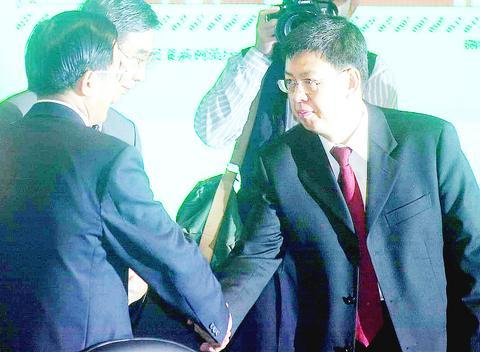When Chen Chien-jen (
Fortunately, the 52-year-old Chen is already a seasoned veteran of the SARS fight.
As a leading epidemiologist in the country, he had been advising the government on its SARS strategy since the outbreak first appeared and was appointed chairman of the SARS Advisory Committee in late March.

TAIPEI TIMES FILE PHOTO
When President Chen Shui-bian (
Over the past few weeks Chen Chien-jen has made numerous appearances on TV giving the latest information on the potentially fatal coronavirus. His lucidity earned much appreciation and helped to establish his authority among the public.
With this hands-on SARS experience and public recognition, it was no surprise when the government announced Chen as the successor of Twu Shiing-jer (
Chen's takeover of the top job at the DOH was the first time the post had been filled by a person with no medical background, something that has sparked anxiety whether or not he can lead the department and successfully mobilize the nation's medical system.
In the medical field, seniority is often an important quality that enables director-generals to effectively manage hospitals and other personnel.
If superintendents of major hospitals are further up the seniority scale than the head of the health department, they might ignore orders from above, simply because they believe the DOH chief is too young and inexperienced.
Hospital chiefs also want the DOH head to come from a medical background because they believe that clinical experience helps breed a similar way of thinking that both people can relate to.
Such worries, however, may be unfounded.
"There is no need to worry whether Chen can proceed with his work smoothly," said Chen Tzay-jinn (陳再晉), former director of the Center for Disease Control. "He has got the ability and reputation to do the job."
"There have been previous director-generals who, although they carried a doctor's license, did not have much clinical experience," he said.
Chen's abilities are indeed noteworthy.
He earned a master's degree in public health from National Taiwan University in 1977, and he completed his doctor's degree in epidemiology at Johns Hopkins University in 1982.
He became a professor of National Taiwan University (NTU) Graduate School of Public Health at the age of 35 in 1986, and later the head of the NTU College of Public Health at the age of 48.
He was the instructor to both director of Taipei City Bureau of Health Chiu Shu-ti (邱淑媞) and deputy director-general of the DOH Lee Lung-teng (李龍騰) when the two were in graduate school.
At 47, he was also honored with the title of researcher at the Academia Sinica.
He was the vice chairman of National Science Council before switching to the DOH.
Chen also has a strong political family background.
His father, Chen Hsin-an (
Chen will fly to Geneva tonight to participate in the World Health Assembly (WHA), as the official representative for Taiwan. The WHA is usually attended by the ministers of health departments of the member countries.
Regarding Taiwan's efforts to become an observer of WHO, Chen said, "We have a better chance than last year, and we will do everything possible to achieve the goal."

Chinese Nationalist Party (KMT) Chairman Eric Chu (朱立倫), spokeswoman Yang Chih-yu (楊智伃) and Legislator Hsieh Lung-chieh (謝龍介) would be summoned by police for questioning for leading an illegal assembly on Thursday evening last week, Minister of the Interior Liu Shyh-fang (劉世芳) said today. The three KMT officials led an assembly outside the Taipei City Prosecutors’ Office, a restricted area where public assembly is not allowed, protesting the questioning of several KMT staff and searches of KMT headquarters and offices in a recall petition forgery case. Chu, Yang and Hsieh are all suspected of contravening the Assembly and Parade Act (集會遊行法) by holding

PRAISE: Japanese visitor Takashi Kubota said the Taiwanese temple architecture images showcased in the AI Art Gallery were the most impressive displays he saw Taiwan does not have an official pavilion at the World Expo in Osaka, Japan, because of its diplomatic predicament, but the government-backed Tech World pavilion is drawing interest with its unique recreations of works by Taiwanese artists. The pavilion features an artificial intelligence (AI)-based art gallery showcasing works of famous Taiwanese artists from the Japanese colonial period using innovative technologies. Among its main simulated displays are Eastern gouache paintings by Chen Chin (陳進), Lin Yu-shan (林玉山) and Kuo Hsueh-hu (郭雪湖), who were the three young Taiwanese painters selected for the East Asian Painting exhibition in 1927. Gouache is a water-based

Taiwan would welcome the return of Honduras as a diplomatic ally if its next president decides to make such a move, Minister of Foreign Affairs Lin Chia-lung (林佳龍) said yesterday. “Of course, we would welcome Honduras if they want to restore diplomatic ties with Taiwan after their elections,” Lin said at a meeting of the legislature’s Foreign Affairs and National Defense Committee, when asked to comment on statements made by two of the three Honduran presidential candidates during the presidential campaign in the Central American country. Taiwan is paying close attention to the region as a whole in the wake of a

OFF-TARGET: More than 30,000 participants were expected to take part in the Games next month, but only 6,550 foreign and 19,400 Taiwanese athletes have registered Taipei city councilors yesterday blasted the organizers of next month’s World Masters Games over sudden timetable and venue changes, which they said have caused thousands of participants to back out of the international sporting event, among other organizational issues. They also cited visa delays and political interference by China as reasons many foreign athletes are requesting refunds for the event, to be held from May 17 to 30. Jointly organized by the Taipei and New Taipei City governments, the games have been rocked by numerous controversies since preparations began in 2020. Taipei City Councilor Lin Yen-feng (林延鳳) said yesterday that new measures by